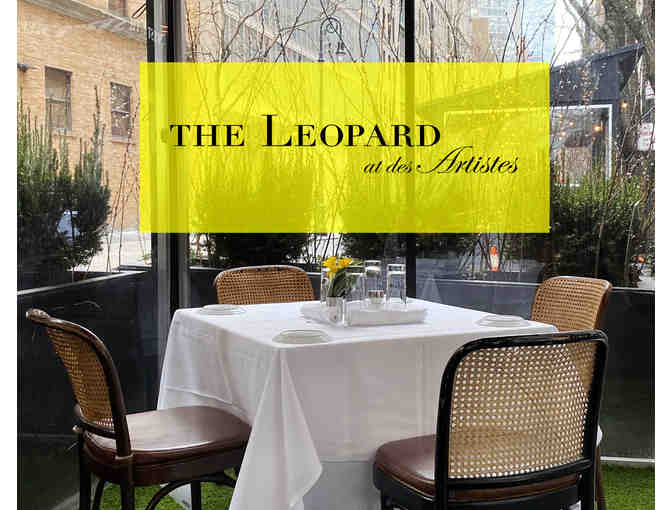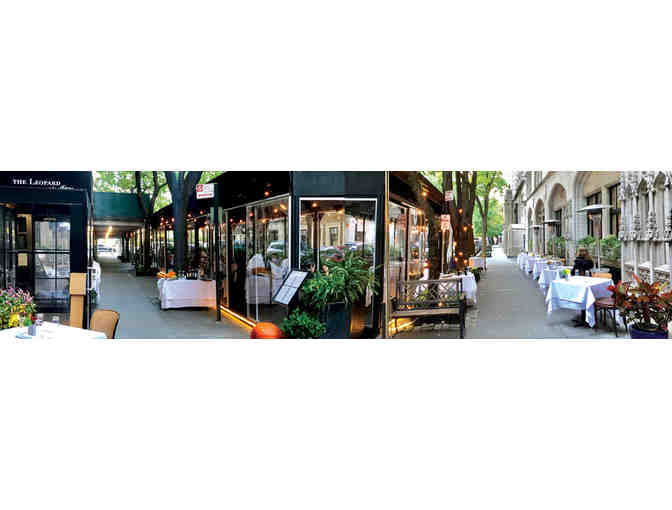Dining
4-Course Chef tasting menu with wine pairing for two (2) to The Leopard at des Artistes
- Item Number
- 152
- Estimated Value
- 400 USD
- Sold
- 400 USD to mm12eb615
- Number of Bids
- 7 - Bid History
Item Description
Bid for your chance to win a four course Chef tasting menu with wine pairing for two (2) to The Leopard at des Artistes on W 67th St. The restaurant serves traditional southern Italian comfort food, using authentic ingredients and keeping the tradition of Italian culture and hospitality.
Reservations are be accepted for both indoor dining and outdoor patio.
Located at 1 West 67th Street (between Columbus & Central Park West)
Read more about The Leopard at des Artistes' roots (via their website):
"The reason for Italian culinary fragmentation is simple: With the exception of the nobility and the clergy, before WWI most Italians simply didn't travel, and as a result every town and every valley has something unique. Neighboring towns and valleys will also share techniques, or recipes, albeit with individualistic twists, but from one end of a region to the other the picture can change completely. Therefore, when speaking of regional cuisines, it's a good idea to keep in mind that we are really dealing with a series of local cuisines, each of which is related to those around it. Great distinctions from North to South of Italy, such as the use of fats (think butter versus olive oil), the kinds of pastas, popular vegetables - the South is much warmer and has a much longer growing season - and of course, huge foreign influences.
Given its position in the middle of the Mediterranean, Italy is a crossroads, and many foreign powers have left their mark. Quite a bit of French influence (regional French, not haute cuisine) can be find in the areas of Liguria, Piemonte, and the Valle D'Aosta bordering France, and Austro-Hungarian influences in the Veneto, Trentino Alto Adige, and Friuli Venezia Giulia. There is also Spanish influence, especially in Milano, which was under the Spaniards for a time; this Spanish influence surfaces again in the South, which was ruled by the Bourbons until the unification of Italy in mid 1800s, and in Sardinia, which was ruled directly by Spain for a time. English influence in Tuscany, where the classic bistecca alla Fiorentina and zuppa Inglese, English steak and English trifle, respectively, were initially prepared for the enjoyment of the sizeable English colony that settled Tuscany in the 1800s. Also, Jewish influences in Rome, dating to the 1500s, when Jews fleeing the Inquisition settled in the Eternal City. Finally, in Sicily you'll find a fascinating mixture of Roman influence, Arab influences dating both to the time that Sicily was an Arab province, and to more recent trade with North Africa, Norman French influence, and Spanish influence.
The Kingdom, Naples as capital, was the largest and wealthiest of the Italian states before Italian unification. Lampedusa's master piece, Il Gattopardo - so wonderfully portrayed by the novel, and later by Luchino Visconti's masterpiece, THE LEOPARD - chronicles the changes in Sicilian life and society during the Risorgimento, period when Giuseppe Garibaldi, the hero of Italian unification, swept through Sicily with his forces, known as The Thousand, to create the single state of Italy in the 19th century.
Everyday food done with respect to Italian cultural traditions, absolute quality of ingredients, hospitality, and outstanding service is our formula, and life passion. We look forward to welcoming you to our home, in one of the most iconic spaces in New York City, Hotel des Artistes. Buon appetito!"
Reservation required / Gratuity not included
Certificate to expire on 10/15/23
Donated By:
Manhattan Country School stores data...
Your support matters, so Manhattan Country School would like to use your information to keep in touch about things that may matter to you. If you choose to hear from Manhattan Country School, we may contact you in the future about our ongoing efforts.
Your privacy is important to us, so Manhattan Country School will keep your personal data secure and Manhattan Country School will not use it for marketing communications which you have not agreed to receive. At any time, you may withdraw consent by emailing Privacy@frontstream.com or by contacting our Privacy Officer. Please see our Privacy Policy found here PrivacyPolicy.




 Westside Market
Westside Market
 Costco
Costco
 Trader Joe's
Trader Joe's
 The Hungarian Pastry Shop
The Hungarian Pastry Shop
 Levain Bakery
Levain Bakery
 St. James Gate
St. James Gate
 Hi Life
Hi Life
 Vanessa's Dumplings
Vanessa's Dumplings
 Awash Ethiopian Restaurant
Awash Ethiopian Restaurant
 Oasis Jimma Juice Bar
Oasis Jimma Juice Bar
 Make My Cake
Make My Cake
 Blue Marble
Blue Marble
 Lezza Foods
Lezza Foods
 Tattly
Tattly
 West Side Kids
West Side Kids
 Harlem Grown
Harlem Grown
 Jamali Floral & Garden Supplies
Jamali Floral & Garden Supplies
 H&H Bagels
H&H Bagels
 Harvest Moon Farm & Orchard
Harvest Moon Farm & Orchard
 Modern Bread and Bagel
Modern Bread and Bagel
 Sullivan Street Bakery
Sullivan Street Bakery
 Orwashers
Orwashers
 Plant Shed
Plant Shed
 Salinger's Orchard
Salinger's Orchard
 Sofia Storage
Sofia Storage
 Richard Corman Photography
Richard Corman Photography
 Yuba Bicycles LLC
Yuba Bicycles LLC